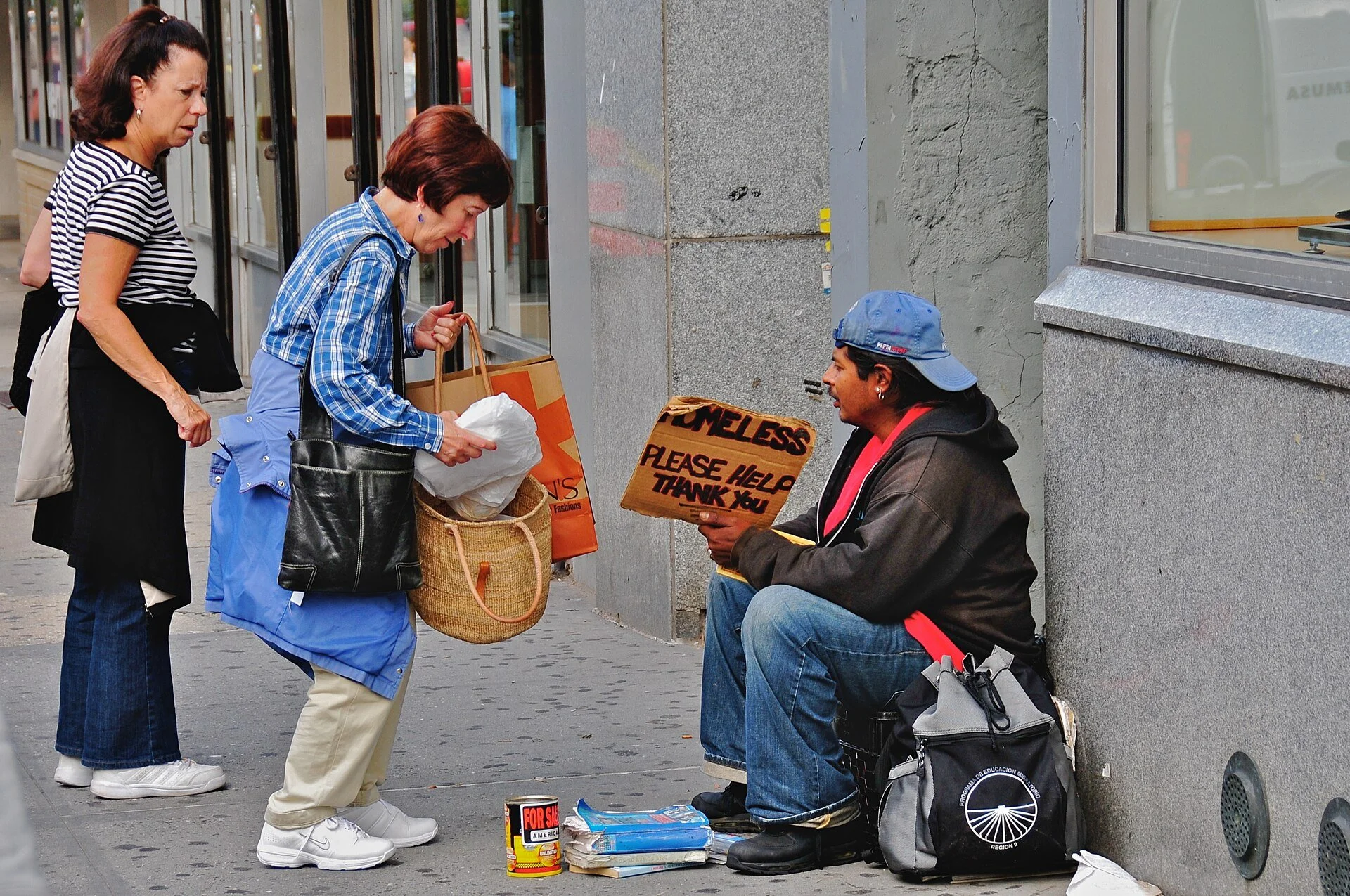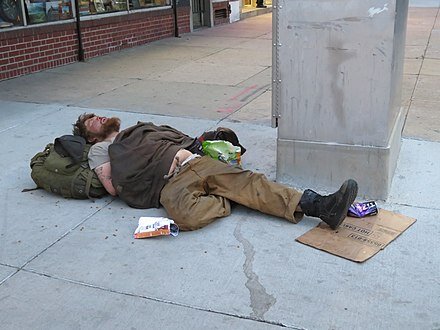
Homeless surge into the affluent Back Bay
- Photo by Ed Yourdon
The Boston Public Library, on Copley Square. The peculiar lighting is from sunlight reflected off a high rise nearby. Homeless people have been congregating in increasing numbers on the square.
— Photo by Daniel Schwen
Excerpted from The Boston Guardian
“Back Bay landmarks were experiencing a surge in homeless occupancy even before the city cracked down this week on the South End encampment known as Mass & Cass, making stakeholders anxious about potential displacement.
“A range of factors have increased disruptions from unhoused Bostonians around heavily trafficked landmarks like the Boston Public Library (BPL), Prudential Center and Copley Square.
“With the city pledging to enforce anti-tent ordinances once and for all on the city’s largest encampment, civic and business groups in the Back Bay worry they’ll bear the brunt of the fallout.
“Meg Mainzer-Cohen, president of the Back Bay Association, says recent months have already seen a dramatic rise in homeless displacement to the Back Bay, a timeline that coincides with the spike in South End violence and the city’s warnings that it would soon disperse the encampment.
“‘In August things were very quiet, especially given the warm weather. By September, the situation had changed dramatically and we saw a major increase in people in need of services in the neighborhood,’ she said. ‘There’s a large presence in front of the library with a massive influx of people and what feels like an encampment.”’
To read the whole article, please hit this link.
Chris Powell: Saudi connection of governor’s wife; using old motels to help the homeless
The Saudi flag
MANCHESTER, Conn.,
During last year's campaign for governor, leading Connecticut Democrats from Gov. Ned Lamont on down may not have known that they were probably being hypocritical by criticizing the Republican nominee, Bob Stefanowski, for doing consulting work for a company connected to the Saudi Arabian government.
But now that it has been disclosed that the investment fund company run by the governor's wife, Ann Huntress Lamont, has a partnership with a Saudi government investment fund, try to find those Democrats.
The governor himself can assert that he didn't know about his wife's own connection to the awful Saudis and can note that the connection was listed in a public financial filing somewhere -- as if there is enough journalism left in Connecticut to review such filings promptly, and as if Mrs. Lamont's investment fund issued a press release about its Saudi connection any more than Stefanowski did about his.
Bad as the Saudi government may be, totalitarian and theocratic, it long has been a crucial financial and military ally of the United States, and Stefanowski had a plausible defense for his work in the country, which was to speed the transition from the country's oil-based economy to “green” hydrogen-based energy.
For all anyone knows -- Mrs. Lamont isn't talking -- her partnership with the Saudi government may have similar objectives. Or Mrs. Lamont's company may just be helping to invest some of the U.S. dollars that the kingdom has earned selling its oil to the United States and the rest of the world, oil purchases that long have implicated all Americans in Saudi totalitarianism.
Was Mrs. Lamont's company in partnership with the Saudi company even when her husband and his Democratic colleagues were denouncing Stefanowski for a similar connection? Maybe.
Did she not mention the irony to her husband? Who knows?
Since the hypocrisy and sleaze here involve Democrats instead of Donald Trump, will mainstream journalism let it drop?
xxx
Homelessness has risen in Connecticut for a second straight year, even as the state is full of hotels and motels that are operating at less than capacity or aren't operating at all.
City government in New Haven, where homelessness is acute, is aiming to acquire a local motel to turn it into "supportive housing," providing not only basic shelter but also connection to medical, psychological, and employment services.
Meanwhile, Danbury's zoning board is still disgracefully blocking a bid by a social-service agency to use a defunct motel for similar purposes.
Under-used and defunct motels and hotels are perfect for addressing homelessness. They require no extensive conversion to become “supportive housing” and are in commercial zones -- and lovely as summer in Connecticut is, winter will be here soon enough.
The homeless, many of whom are mentally ill or drug-addicted, have no political constituency. The economy is not half as good as elected officials claim after they manipulate economic data, and times are getting harder, so escaping from homelessness, addiction and long-term unemployment is more difficult than most people think.
Of course most state residents don't want "supportive housing" nearby any more than they want "affordable" housing nearby, since "affordable" housing can shelter not just young people starting out in life but also the demoralized, addicted, broken-down, and anti-social. But if Connecticut is to remain decent, these people have to be accommodated somewhere so they don't have to sleep under bridges and risk death in the street.
For many months now Governor Lamont has taken the lead with the motel in Danbury, issuing and renewing an executive order exempting it from city zoning. But the order has expired even as homelessness is worsening.
So the governor should use whatever emergency authority he can still muster, calling the General Assembly into special session if necessary, to authorize state government to acquire such property as necessary and to supersede municipal zoning to put a roof over the heads of the forsaken before winter arrives and help them restore themselves, and to ensure that no municipality has to use its own funds to do this.
Chris Powell has written about Connecticut government and politics for many years (CPowell@cox.net).
Find safer places for homeless
From Robert Whitcomb’s “Digital Diary,’’ in GoLocal24.com
“Tent cities” of homeless people are all over the place. A particularly noticeable one was the camp just closed down in Pawtucket on the west bank of the Seekonk River to make way for a soccer-stadium project, which might actually get built.
Many, probably most, of the people at this camp are mentally ill. In these places they might find kindred spirits but they also face such dangers as exposure to the elements, assaults and thefts. And the atmosphere is conducive to alcohol and drug abuse.
These tent cities have been common since the de-institutionalization movement that got going in the late ‘60s, when officials hoped that new psychotropic medications would allow many of the mentally ill to be released from state mental hospitals, saving taxpayers money. But for many mentally ill people this didn’t work out because they didn’t like the side-effects of these meds for such illnesses as schizophrenia and manic-depression (aka bi-polar disease). For that matter, some of these people like feeling “crazy.’’
Or some have not been given adequate guidance on how to use the meds or don’t have a way to pay for them or can’t get to pharmacies to get them.
I think that we need more mental hospitals for long-term care. As for those people, mentally ill or not, who actually prefer to live in settings like tent cities, the states and localities should consider setting aside permanent places for them on public land, or rent space from private landowners, where the “campers’’ could be better monitored by police, social workers and public-health agencies. Moveable tent cities pose too many dangers. And be they temporary or permanent, they should not be near regular residential or commercial areas; they are too disruptive.
Folks seeking help with serious mental-health and/or substance-abuse problems might want to look at this Rhode Island state Web site to find available spaces at institutions.
Llewellyn King: Homelessness in America at crisis point
The British call it sleeping rough. We call it for what it is: homelessness.
It starts the day when all the support systems -- fragile as they often are -- fail. When there is no home to go to; no bed to sleep in, no meal to eat, no toilet to use, no place to wash even a face -- just the hard, cold and often wet streets that offer no succor. The hospitality of a concrete sidewalk is scant.
That is what faces 4 million luckless children each year in the United States, according to Renee Trincanello, chief executive officer of Covenant House Florida, which operates shelters in Ft. Lauderdale and Orlando. Once they hit the streets, they are vulnerable to every horror that can happen to a child, including sex trafficking. “They also are used by drug dealers to inculcate a habit,” Trincanello told me.
In the United States, homelessness is at a crisis point. Cities are clogged with the homeless from coast to coast. If you travel a lot, as I do, you are aware of how homelessness is at its most conspicuous where there is prosperity -- a byproduct of high rents in cities like San Francisco, Austin, New York and Boston.
Very close to the Capitol in Washington, around Union Station, the homeless sleep on the sidewalks, sometimes with the barest needs met by charities -- needs like a sleeping bag, if they have been identified and are lucky. Train stations are a mecca for the homeless because they have public toilets and offer warmth. But Union Station has removed most of its seating to keep out the homeless.
To draw attention to the misery and extreme danger of children sleeping in the streets, and to raise money, Covenant House branches in the United States, Canada and Latin America organize sleep outs. Once a year, executives like my friend Jan Vrins, managing director and leader of Navigant’s global energy practice, takes a sleeping bag, puts it on top of a cardboard box and gets a hard night’s rest on a parking lot pavement.
Vrins says, “It isn’t fun to sleep in a concrete parking lot on a carton box with a sleeping bag. But the time we spend with these youths before we sleep out is wonderful. First, we have dinner with them and have sessions where they share their stories.” Afterward, the children are safely tucked up in the shelter and the adults repair to the parking lot.
In every case, Vrins says, something has happened to them. “Their families have broken up, sometimes because of addiction; there have been storms, as in Puerto Rico, and they end up in the shelters. So, climate change is leading to more kids on the street,” he says.
Vrins says that he was introduced to Covenant House by an executive from Florida Power & Light. “That was 11 years ago, and I got hooked,” he says. Now he is Covenant House Florida’s vice chairman.
Trincanello, who is married with two daughters, has spent her career with Covenant House. She told me that her father wanted her to be a lawyer; she pushed back and became a social worker.
If you sign up to sleep out with Covenant House, whether it is in chilly Toronto or as, as Vrins notes, more benign Florida, you will join some of the cream of America’s executive talent from Accenture and Black Rock, to Cisco, KPMG and other companies. In fact, prominent companies field “teams.”
Vrins, who is married with two sons, heads the Navigant team. Each sleeper is expected to raise $1,000 for Covenant House. This year, he laid down on the concrete in Ft. Lauderdale on Nov. 26. He says 130 people slept out there and raised $270,000.
A native of the Netherlands, Vrins is one of those gregarious people who puts his arms around you with his smile. He speaks with passion and love of the homeless children in their crises. Trincanello, whom I have not met, has a voice as warm as a winter hearth. I can imagine it melting fear in a scared child. Together they do work which is not a molecule short of noble.
Vrins says of sleeping out: “When you wake up in the morning, you feel blessed. When homeless kids must look for the next place to spend the night, you feel blessed.”
Llewellyn King is executive producer and host of White House Chronicle, on PBS. He’s based in Rhode Island and Washington, D.C.
On Twitter: @llewellynking2







